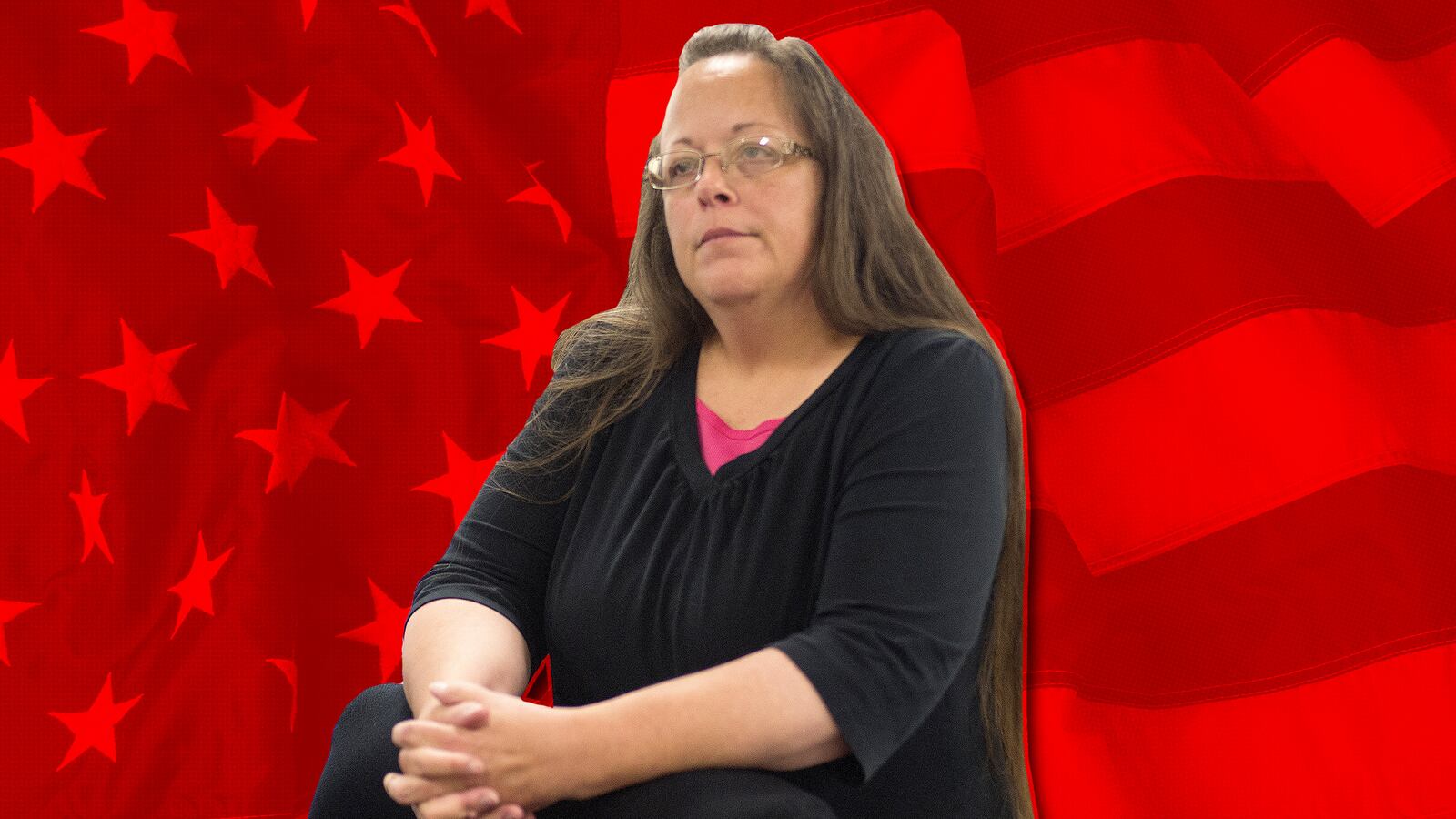There are going to be some people who celebrate scofflaw County Clerk Kim Davis sitting behind bars. Most of them are her allies. Not even the American Civil Liberties Union lawyers wanted to send poor Kim to the pokey—likely because they wanted to deny her (and her allies) the exact image they've now been granted: the long-faced Davis in handcuffs, dourly professing that she loves Jesus more than she does the law.
“Civil disobedience” is fine—but they don’t call it being a “civil servant” because the county courthouse is run by Christian Grey. She’s supposed to do her job, not decide what it is. But Davis, temperamentally, is obviously more of a top, anyway, and probably should have sought a job in line with her personality. Maybe at the DMV.
The only thing louder than Davis’s protestations is the jingle of the coins being dropped in all the various collection boxes that lay claim to some similar cause. In our curious hate-donating economy, Davis will undoubtedly receive some monetary reward for showmanship—whether it comes via GoFundMe or a book contract—but it will be a fraction of what’s raised by the political ambulance-chasers dutifully filing in behind her.
Already many of the GOP presidential candidates have weighed in, creating the curious spectacle of lawmakers pre-emptively breaking their oaths of office: How can you promise to “uphold the Constitution” if you have already admitted that it has a loophole big enough for Davis to fit through?
The judge who ordered Davis to be held in contempt, and the deputy clerks who started issuing marriage licenses, may be the only Republican left who realizes that Davis’s stunt is something besides a fundraising appeal. Or, rather, he seems to understand that Davis offers only the literal fundraising appeal to end all fundraising appeals. Follow her logic to its fiery end—the Bible as the ultimate legal authority—and there would be no political offices left to run for, just law enforcement positions.
There are regimes like that in the world; we’re fighting wars with a few of them.
Others have pointed out that Davis’s brand of Christianity is itself not too far removed from the sort of blinkered false-purity doctrine that rules radical Islam: the prohibition on makeup or clothes that come in anything besides a hazmat-suit cut. But if you want to understand just how antithetical to democracy Davis’s ideas are, don’t think about what her church doesn’t allow. Instead, imagine what kind of world would make Kim Davis happy.
Davis, after all, was not merely registering an objection to same-sex marriage, she is objecting to the notion of civil society, to “liberalism” not as a policy position but a modern ideal. In my understanding of liberal democracy, a Christian county clerk signing the marriage licenses of gay couples is to be celebrated—for the exact same reasons we celebrate the right of non-Muslims to draw Mohammed: The idea that any one person’s individual religious preference should end the instant it imposes on the rights of another. The true test of religious liberty isn’t whether or not you can practice your own, but if your society has room for yours and a few others.
To judge by her written statements, I am not not much over-worried that Davis’s turn in a jail cell will produce anything besides more vague boilerplate religious freedom stew. In response to questions from Think Progress, fellow members of her denomination couldn’t even identify the precise theological dogma they were sure she was trying to defend: Apostolic Christianity, a lay leader explained, “does not have lengthy, codified statements on marriage, divorce, or homosexuality. Instead, he said, members usually look to one document for answers…The King James Bible.”
The sect’s aversion to reasoned argument means we will probably not be treated to Davis’s own “Letter from an Ashland Jail,” which is just as well, since neither she nor her movement would benefit from a direct comparison to Martin Luther King’s pointed yet lyrical rejoinder to the clergymen who objected to his civil disobedience, both as a tactic and with its target.
King justified the Birmingham business boycott that led to his imprisonment (he and others defied a court injunction against the protest) with a list of humiliations suffered by black men and women in the South—and it does not include anything remotely like “being forced to sign a piece of paper.”
Rather, it includes the kind of bodily harms—and quotidian insults—that reverberate for both people of color and those in the LGBT community today. Indeed, King presciently articulates exactly why obtaining the same marriage license granted to opposite-sex couples matters, because without the complete protection of equality under the law, those discriminated against are “living constantly at tiptoe stance, never quite knowing what to expect next, and are plagued with inner fears and outer resentments.” They are, King writes, “forever fighting a degenerating sense of ‘nobodiness.’”
One of the members of the couple to whom Davis denied a marriage license put it in only slightly less poetic terms: “When you’re gay and you grow up in Kentucky, you kind of get used to hiding who you are, accommodating other people and making them feel comfortable. You don’t realize how much of your own dignity you’ve given away. It catches up to you.”
King pleaded with the other men of faith to come around to his cause: “Too long has our beloved Southland been bogged down in a tragic effort to live in monologue rather than dialogue.” Davis, it must be noted, is in jail precisely because she believes in monologue. Her belief that she should not be forced to interact with those she disagrees with is born of the same bigotry as segregation—even if on the surface it looks like the most banal interactions: paperwork.
That she could interpret the presence of her signature on a marriage certificate as evidence of her own sin isn’t a testament to the strength of her convictions, but to the height of her arrogance.






